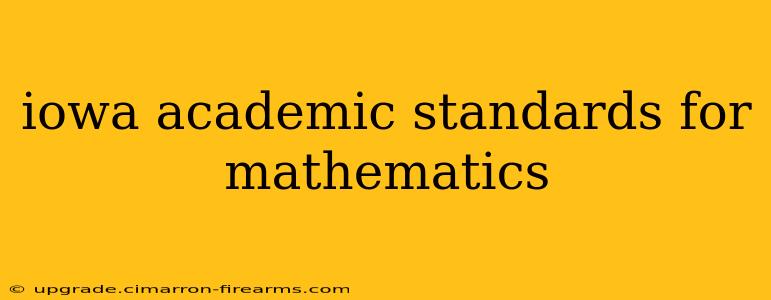Iowa's academic standards for mathematics aim to equip students with the critical thinking, problem-solving, and analytical skills necessary to succeed in a data-driven world. These standards, revised in recent years, provide a framework for educators to build rigorous and engaging mathematics curricula. This guide delves into the key aspects of these standards, offering insights for parents, educators, and students alike.
Understanding the Iowa Core Curriculum
The Iowa Core, adopted in 2010, underpins the state's academic standards across various subjects, including mathematics. It emphasizes a college- and career-ready approach, focusing on developing deep conceptual understanding rather than rote memorization. The mathematics standards are organized by grade level, building progressively upon foundational concepts. This ensures students develop a strong mathematical foundation, preparing them for advanced coursework and future endeavors.
Key Areas of Focus within the Iowa Mathematics Standards:
The Iowa Core Mathematics standards are organized around several interconnected areas, emphasizing the interconnectedness of mathematical concepts. These include:
-
Number and Operations: This foundational area covers a wide range of skills, including understanding number systems (whole numbers, integers, rational numbers, and real numbers), performing operations (addition, subtraction, multiplication, division), and applying these skills to solve real-world problems. This extends from basic arithmetic in elementary grades to advanced algebraic concepts in high school.
-
Algebra: Algebra is a crucial component of the Iowa Core, progressing from early algebraic thinking (identifying patterns, using variables) in elementary school to solving complex equations and inequalities in high school. Students learn to represent relationships symbolically, graphically, and numerically.
-
Geometry: The geometry standards cover various topics, including shapes, spatial reasoning, measurement, and transformations. Students learn to analyze geometric figures, apply theorems, and solve problems involving area, volume, and other geometric properties. This progresses from basic shape recognition to advanced geometric proofs and coordinate geometry.
-
Measurement and Data Analysis: This area focuses on understanding and using measurement units, collecting, organizing, and analyzing data, and interpreting statistical information. Students learn to create and interpret graphs, charts, and tables, and apply statistical methods to draw conclusions.
-
Probability and Statistics: These standards introduce students to the concepts of probability and statistics, helping them understand chance, data analysis, and statistical inference. Students learn to calculate probabilities, analyze data sets, and make predictions based on statistical information.
How Iowa's Standards Prepare Students for the Future
The Iowa Core Mathematics standards are designed to prepare students for success in college, careers, and life. By emphasizing conceptual understanding, problem-solving, and critical thinking, the standards aim to develop students who are:
-
College and Career Ready: The standards align with national and international benchmarks, ensuring Iowa students are competitive in higher education and the workforce.
-
Critical Thinkers and Problem Solvers: The emphasis on problem-solving skills equips students to approach complex challenges effectively, utilizing their mathematical knowledge to find creative and efficient solutions.
-
Data Literate: In today's data-driven world, understanding and interpreting data is crucial. The Iowa standards cultivate this essential skill, preparing students to navigate information critically and effectively.
Accessing the Standards and Resources
The complete text of Iowa's academic standards for mathematics is readily available on the Iowa Department of Education website. This website also provides valuable resources for educators, parents, and students, including sample assessments, instructional materials, and professional development opportunities.
Conclusion
Iowa's academic standards for mathematics represent a commitment to providing students with a high-quality, rigorous mathematics education. By focusing on deep conceptual understanding, problem-solving skills, and critical thinking, these standards aim to equip students with the tools they need to succeed in a rapidly changing world. Understanding and utilizing these standards is crucial for fostering a strong mathematical foundation and preparing students for future success.

